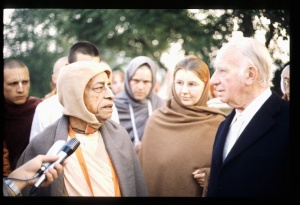CC Adi 10.11 (1975)

A.C. Bhaktivedanta Swami Prabhupada
Below is the 1996 edition text, ready to be substituted with the 1975 one using the compile form.
TEXT 11
- cāri bhāi sa-vaṁśe kare caitanyera sevā
- gauracandra vinā nāhi jāne devī-devā
SYNONYMS
cāri bhāi—four brothers; sa-vaṁśe—with all family members; kare—do; caitanyera—of Lord Śrī Caitanya Mahāprabhu; sevā—service; gauracandra—Gaurasundara (Lord Caitanya Mahāprabhu); vinā—except; nāhi jāne—they do not know; devī—goddess; devā—or god.
TRANSLATION
These four brothers and their family members fully engaged in the service of Lord Caitanya. They knew no other god or goddess.
PURPORT
Śrīla Narottama dāsa Ṭhākura has said, anya-devāśraya nāi, tomāre kahinu bhāi, ei bhakti parama-kāraṇa: if one wants to become a pure, staunch devotee, one should not take shelter of any of the demigods or -goddesses. Foolish Māyāvādīs say that worshiping demigods is as good as worshiping the Supreme Personality of Godhead, but that is not a fact. This philosophy misleads people to atheism. One who has no idea what God actually is thinks that any form he imagines or any rascal he accepts can be God. This acceptance of cheap gods or incarnations of God is actually atheism. It is to be concluded, therefore, that those who worship demigods or self-proclaimed incarnations of God are all atheists. They have lost their knowledge, as confirmed in the Bhagavad-gītā (BG 7.20): kāmais tais tair hṛta-jñānāḥ prapadyante ’nya-devatāḥ. “Those whose minds are distorted by material desires surrender unto demigods.” Unfortunately, those who do not cultivate Kṛṣṇa consciousness and do not properly understand the Vedic knowledge accept any rascal to be an incarnation of God, and they are of the opinion that one can become an incarnation simply by worshiping a demigod. This philosophical hodge-podge exists under the name of the Hindu religion, but the Kṛṣṇa consciousness movement does not approve of it. Indeed, we strongly condemn it. Such worship of demigods and so-called incarnations of God should never be confused with the pure Kṛṣṇa consciousness movement.